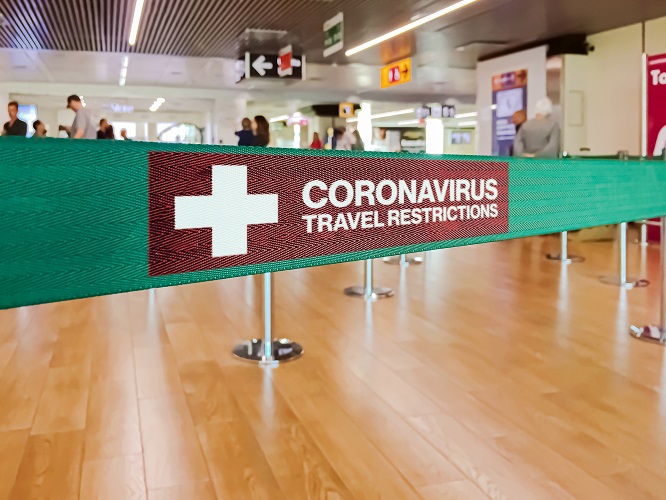

Covid-19: Brazilian Government restricts the entry of foreigners and introduces new measures at airports
Provisional Presidential Decrees and Ordinances take new actions in the fight against Covid-19
Amid the measures introduced by Brazilian authorities to avoid the spread of the coronavirus, especially concerning the transit of people and the restriction of airport activities, the Federal Government has established new guidelines such as those addressed in Law No. 13,979, published in February 2020. This Law assigns the possibility for authorities (from federal, state and municipal levels) to take – within the scope of their powers – exceptional measures to face the pandemic, including the determination of compulsory medical examinations, tests, collection of samples and other prophylactic measures.
However, several Provisional Presidential Decrees (“PDs”) were published to amend Law No. 13,979, such as the PD No. 926, published on March 20, 2020. The provision in the aforementioned PD allows the authorities to introduce measures for exceptional and temporary restriction of entry and exit of the national territory and locomotion between states and cities, through highways, ports or airports.
Another relevant aspect of the PD No. 926 is the prohibition of restrictions on the locomotion of workers that may affect the operation of public services and essential activities, such as cargo of any kind that may lead to the shortage of indispensable goods for the population.
However, in order to introduce certain measures, the consent of the Brazilian Health Regulatory Agency (“ANVISA”) is required. According to Law No. 9,782, published in 1999, ANVISA is responsible for carrying out epidemiological surveillance activities at ports, airports and borders. In that sense, the “Protocol to Confront Covid-19 at Ports, Airports and Borders” was issued by ANVISA on February 6, 2020, and updated on February 19, 2020, determining the application of certain measures, among which are:
- Intensification of the surveillance on suspect cases of Covid-19 for immediate notification to epidemiological surveillance institutions, as the definition of suspect cases determined by ANVISA;
- Approach to international flights, by prioritizing aircraft carrying passengers with symptoms that match the definition of a suspect case or those flights with the highest number of passengers coming from an area of local transmission of Covid-19;
- Broadcasting and monitoring of public announcements in English, Portuguese, Mandarin and Spanish about signs, symptoms and basic care, such as washing hands frequently and covering the nose and mouth when coughing or sneezing;
- Issuance of guidelines for the use of Personal Protective Equipment by airport workers;
- Arrangements to fulfill requests of travelers’ lists, from flights and boats, aiming at the investigation of suspect cases and their contact with other people, making the appropriate arrangements, according to the flow jointly defined with the Ministry of Health;
- Issuance of guidelines and introduction of surveillance to make terminal managers broaden the number of hand sanitizer locations;
- The suggestion of home isolation for suspect cases which present mild symptoms and hygiene inspections of aircraft flying across the country; and
- Intensification of the surveillance over suspect cases of Covid-19 at entry points for immediate guidance on home isolation and the notification to epidemiological surveillance institutions, according to local or community transmission networks.
Furthermore, ANVISA has published a travel brochure with recommendations for safe essential travelling during the pandemic and with specific guidance for passengers travelling abroad.
States seek to introduce independent restrictive measures
Although ANVISA is regulating the matter, a few states – aiming at introducing additional measures and/or without the support of any technical recommendation from ANVISA – are questioning the exclusive jurisdiction of the Agency to carry out epidemiological surveillance activities, as well as the technical relevance of the protocols already approved by ANVISA. Thus, some states such as Bahia, Ceará, Maranhão and Rio Grande do Norte obtained preliminary injunctions authorizing the introduction of measures that create “sanitary barriers” to install passenger screening checkpoints inside airports, especially in restricted areas.
The issue is controversial and, therefore, these court decisions may be modified on a definite basis. For example, the Regional Federal Court of the 1st Region(TRF-1) modified the injunction granted to the State of Maranhão as it considered that ANVISA’s jurisdiction on airport sanitary inspection remains according to the PD No. 926 and that ANVISA may not be constrained to introduce a practice that it deems disproportionate or unnecessary to the contingency of the disease, as expressed in ANVISA’s Technical Report No. 30/2020. The Superior Court of Justice, on the other hand, did not accept a request from the government of Bahia to suspend the injunction modified by TRF-1, which prohibited the implementation of a “sanitary barrier” at the state’s airports, alleging that it concerns a constitutional matter.
The lawsuit of the State of Bahia was taken to the Federal Supreme Court, along with another lawsuit on the same subject from the State of Maranhão. In the ruling of the Suspensions of Injunction No. 172 and 173, the President of the Federal Supreme Court, Justice Dias Toffoli, maintained the TRF-1 understanding, accepting the arguments brought by ANVISA to refuse the suspension of the injunctions. According to Toffoli, coronavirus is a highly transmissible disease, infected people may be asymptomatic and non-infected people may present the symptoms of the virus, which means that a “sanitary barrier” does not necessarily prevent the spread of the disease. Conversely, according to Justice Toffoli, the barriers could lead to the agglomeration of people and overload the healthcare system, which would lead to an increased risk of contamination.
In addition, the constitutionality of PD No. 926 was challenged in a Direct Action for the Declaration of Unconstitutionality filed before the Federal Supreme Court. On March 24, 2020, Justice Marco Aurélio decided on the provisional measure and granted concurrent jurisdiction to the federal entities (Union, States, Federal District and Municipalities) to legislate on health matters. To the decision, which was voted on by the plenary session of the Federal Supreme Court on April 15, 2020, it was added an interpretation according to the Constitution concerning article 3 of Law No. 13,979, in order to preserve the constitutional attribution of each branch of government. Thus, additional discussions may arise regarding the jurisdiction of the States to introduce measures concerning health and to control the entry and exit of people from airports against the statements issued by ANVISA.
It is important to highlight that, regardless of judicial discussions on the subject, some states have already adopted “sanitary barriers” at their airports. Most of them consist of the application of questionnaires and the measurement of passengers’ body temperature. At the Florianópolis Airport, for example, through a partnership between the Florianópolis City Hall and the airport concessionaire, initial screening of passengers will be carried out and, if they show symptoms compatible with the coronavirus infection, they will be tested for Covid-19.
In line with PD No. 926, Provisional Presidential Decree No. 927 was published on March 22, 2020, also amending Law 13,979/20 to determine that the measures related to the exceptional and temporary restriction of entry and exit of the national territory and locomotion between states and cities, as recommended by ANVISA, may be under the concurrent jurisdiction of the Ministers of Health, Justice and Public Security and Infrastructure.
Ordinances restrict the entry of foreigners into Brazil
The President’s Chief of Staff and the Ministers of Justice and Public Security, Infrastructure and Health issued, among other regulations, the Interministerial Ordinance No. 340, published on June 30, 2020, to restrict, for 30 days, the entry of foreigners into the country by land, waterway or air regardless of nationality. This Joint Ordinance is based on ANVISA’s technical recommendation for health reasons related to the risks of infection and the spread of the coronavirus.
The restriction of Ordinance No. 340 does not affect, for example, the entry of Brazilians, immigrants with residence in Brazilian territory and cargo transportation. The entry of passengers in international transit is allowed, as long as they do not leave the international area of the airport and the country of destination admits their entry.
Other exceptions are brought by the regulation, such as the entry of foreigners in Brazil carrying a visitor visa for a short stay. The entry is also allowed for those who seek to establish residency for a certain period of time, for academic research, study, investment, and other purposes. In these situations, foreigners must enter by air at Guarulhos, Viracopos, Galeão, or Brasília airports.
Also, on an exceptional basis, Ordinance No. 340 maintained the permission for foreigners who are in countries with land borders with Brazil to enter the country to board a return flight to their country of residence, upon official request from the embassy or consulate of the respective country.
Ordinance No. 149, published on March 27, 2020, was also issued the exceptional and temporary restriction of the entry of foreigners in Brazil by international air travel regardless of nationality when the country of destination or the passenger’s nationality does not admit their entry by air, land or waterway. In this case, the airlines must prevent the boarding of foreigners to Brazil.
Other measures and further developments of regulations that have already taken effect may be published considering the growing number of cases of coronavirus in Brazil and worldwide.
Find below the list of ordinances that restrict the entry of foreigners into Brazil:
Ordinance No. 149, issued on March 27, 2020
Restricted entry by air;
This restriction applies to foreigners, regardless of nationality, who are in international transit by air when the country of destination or their nationality does not admit them by air, land or waterway.
Ordinance No. 340, issued on June 30, 2020
Valid for 30 days;
Restricted entry by land, air and waterway.
This restriction applies to foreigners, regardless of nationality.
For further information, contact our partners of
Aviation,
Infrastructure and Energy, andLife Sciences and Healthcare practice areas.





